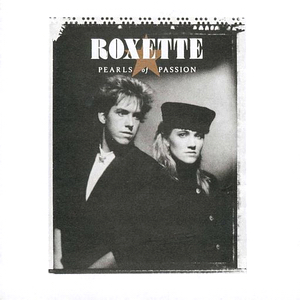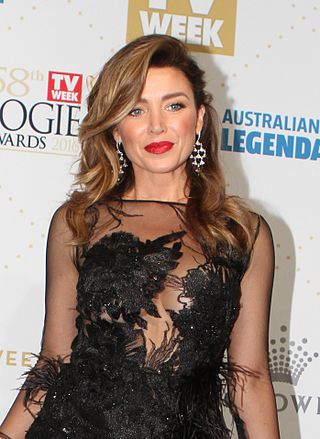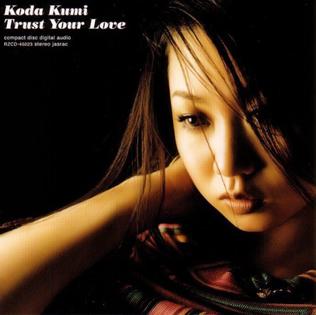
Pearls of Passion is the debut studio album by Swedish pop duo Roxette, originally released on cassette and vinyl on 31 October 1986 in Scandinavia and Canada. The album was remastered and released on CD on 31 October 1997, with several previously unreleased bonus tracks. It was remastered and re-released again in 2009.

Loveppears is the second studio album by Japanese recording artist Ayumi Hamasaki. It was released in Japan, Hong Kong and China on November 10, 1999, through Avex Trax and the China Record Corporation, and distributed worldwide on April 10, 2001, by Avex Entertainment Inc. It was entirely written by Hamasaki herself, while the production was handled by Japanese musician Max Matsuura. Musically, Loveppears is a dance album and lyrically focuses on themes of love, frustration of life, loneliness, and individualism.
"How Come U Don't Call Me Anymore?" is a song by Prince. It is a ballad of romantic longing with some gospel elements. On his original recording of the song, which was released as the non-album B-side to his 1982 single "1999", Prince performs most of the song in his falsetto range, with his own bluesy piano playing providing the only instrumental accompaniment. The song's first album appearance was on his 1993 compilation The Hits/The B-Sides. It was later included on the soundtrack to the 1996 film Girl 6. Prince also performs the song on his 2002 live album One Nite Alone... Live!.

Australian singer Dannii Minogue has released five studio albums, eight compilation albums, twenty-eight singles, twenty-three music videos, and five video albums. Minogue rose to prominence in the early 1980s for her roles in the Australian television talent show Young Talent Time and in the soap opera Home and Away, before commencing her career as a pop singer in the early 1990s.

The Breathtaking Blue is the third album by German synth-pop band Alphaville, released in April 1989. A companion video, Songlines, was released in September 1989. The CD release of this album was one of the first commercial CD+G format discs. Alphaville released three singles from the album, "Romeos", "Summer Rain" and "Mysteries of Love", the first of which charted internationally.

Afternoons in Utopia is the second album by German synth-pop band Alphaville, released in 1986 via Warner Music. The album was recorded between September 1985 and May 1986.
American singer and songwriter Tweet has released three studio albums, one live album, one extended play, 13 singles, two promotional singles, and 13 music videos.

"Shake Me, Wake Me " is a song recorded by the American quartet Four Tops for their third studio album, On Top (1966). It was released in February 1966 as a 7" vinyl single through Motown records. It was written and produced by Brian Holland, Lamont Dozier, and Eddie Holland. A gospel rock track, its lyrics detail a relationship that has ended. It has since been regarded as one of Four Tops' most successful singles ever. It charted moderately well in both the United States and Canada, and became the group's fifth consecutive entry to chart within the top five of the Hot R&B/Hip-Hop Songs chart. Four Tops has performed "Shake Me, Wake Me " on various occasions throughout their careers and have included it on several greatest hits albums, including on The Four Tops Greatest Hits (1967) and The Ultimate Collection (1997).

"Automatic" is a song recorded by Japanese–American singer Hikaru Utada, taken as the lead single from her debut album First Love (1999). It was released on December 9, 1998, through Toshiba-EMI in three physical formats: mini CD single, standard-size CD single and 12" vinyl. Additionally, the single included the A-side "Time Will Tell", which originally served as the B-side for these versions. The song was written and co-produced by Utada, while Akira Miyake and the singer's father Teruzane Utada served as producers. Despite working recording in English under the name Cubic U, "Automatic" is Utada's first Japanese recording, and was released after she enrolled into high school in Japan.

American singer-songwriter Sufjan Stevens has released twelve studio albums, thirteen extended plays (EP), fifteen singles, eight promotional singles, and eight music videos. Through his record label Asthmatic Kitty Records, Stevens released his first two albums A Sun Came and Enjoy Your Rabbit in 2000 and 2001, respectively. For his next two releases – Michigan (2003) and Seven Swans (2004) – the singer partnered with Sounds Familyre Records for the distribution of both releases. Seven Swans was supported by Stevens' debut single "The Dress Looks Nice on You". The same album was reissued in 2009 and included the new single "I Went Dancing with My Sister". His fifth album, Illinois, was his first release to enter record charts, where it reached the lower positions in several countries and was certified Gold by the Recording Industry Association of America for shipments of 500,000 copies. The Avalanche, a compilation album consisting of outtakes from Illinois, was released in 2006 and also reached various charts internationally.

"Time Will Tell" is a song recorded by Japanese–American singer Hikaru Utada, taken as the lead single from their debut album First Love (1999). It was released on December 9, 1998, through Toshiba-EMI in three physical formats: mini CD single, standard CD single and 12" vinyl. Additionally, the single was originally served as a B-side to "Automatic", but was changed into an A-side. The song was written and co-produced by Utada themself, while Akira Miyake and the singer's father Teruzane Utada served as producers. Despite working recording in English under the name Cubic U, "Time Will Tell" is Utada's first Japanese recording, and was released after they enrolled into high school in Japan.

On a Clear Day You Can See Forever is the soundtrack album to the 1970 American film of the same name. It was released by Columbia Records on July 1, 1970 and features singing by Barbra Streisand and Yves Montand, in addition to choral arrangements and live orchestration. No commercial singles were released from the soundtrack, but the reprise version of the title track was released as a promotional single on 7" vinyl by Columbia. Executively and solely produced by Wally Gold, the album's ten tracks were written by Alan Jay Lerner while the music was written by Burton Lane. The album was reissued on compact disc in 2008.

"Trust Your Love" is a song recorded by Japanese singer-songwriter Koda Kumi and was used as the second single from her debut album Affection (2002). It was released on May 9, 2001 via Rhythm Zone in two physical editions: a CD single and 12" vinyl. Additionally, Sounday and Orpheus Records distributed the song in North America with the same formats, but was remixed as a dance number by Hex Hector. The song was written by Kumi herself, whilst composing and production was handled by Kikuchi Kazuhito and Max Matsuura respectively. Musically, it is an R&B song that incorporates synthesizers and keyboards, and describes two lovers believing in each other.

"Guava Jelly" is a song recorded by the Jamaican group Bob Marley and the Wailers. It was released as a 7" vinyl single through Tuff Gong and Green Door Records. It was issued commercially with B-side track "Redder Then Red", which was misspelled on its initial printing, in 1971. It was written and produced by Marley and features uncredited lyrical contributions from Bunny Livingston. A reggae composition like the majority of Marley's works, "Guava Jelly" contains a rocksteady and island-like production with lyrics loosely based around sexual intercourse. His use of the term "guava jelly" was likely referring to a specific type of sexual lubricant. It was favorably viewed by several reviewers, with many of them finding the composition to be sexual and about love. The group placed "Guava Jelly" on several compilation albums, including Africa Unite: The Singles Collection in 2005, and Owen Gray and Herbie Mann created their own versions in 1974 and 1975, respectively.
Carol Lloyd is an American singer from Philadelphia, Pennsylvania. She is known for the release of her two solo albums: Score in 1979 and Love Carol in 1983.

Score is the debut album by American recording artist Carol Lloyd, released on December 31, 1979, through Casablanca Records and Earmarc Records. Following Lloyd's signing with Earmarc, a new label division of Casablanca, she began recording material for the record throughout the latter half of 1979. A disco album, Score was one of the first projects to be released from the label, which specialized solely in disco music. All six of the tracks on the record were produced by Michael Forte and Bruce Weeden, with the former individual also contributing lyrics to four of the aforementioned songs.

"Me and My Foolish Heart" is the debut single by English band Johnny Hates Jazz, released by Rak in 1986. It was written by Phil Thornalley, Calvin Hayes, Iain MacDonald and Mike Nocito, and was produced by Hayes and Nocito. The song was included on the band's 1988 debut album Turn Back the Clock as "Foolish Heart".













